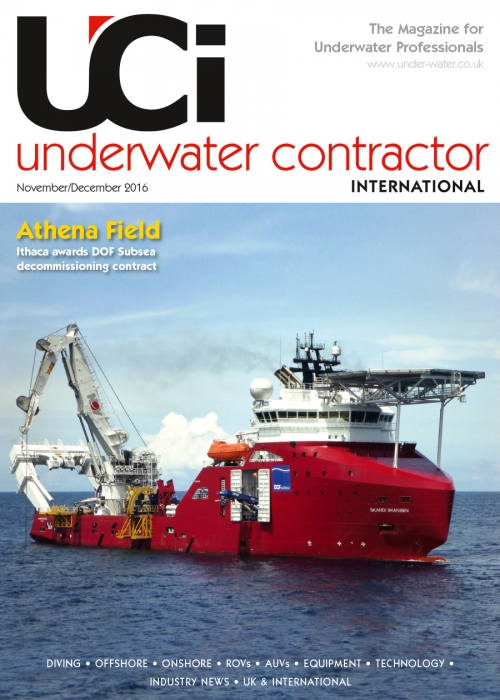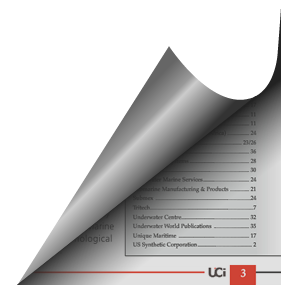
The Magazine for Underwater Professionals
![]() Nov/Dec 2015
Nov/Dec 2015
INDUSTRY NEWS - TRAINING & SAFETY
Commercial diving loses a champion
It is with great sadness that we report the death of commercial diving advocate and UCI columnist Michael Cocks. He passed away on 15 October 2015, one day shy of his 79th birthday, following a short illness.
After 20 years as a London stockbroker and eight years trying to get into Parliament for the Social Democratic Party, Michael found a new challenge in commercial diving. He had his first dive in a Falmouth dive tank in 1989, which led him to launch a personal crusade to promote commercial diver safety, and at the age of 54 qualified as a HSE Part 1 Diver.
At the time he was concerned that the onshore diving industry was almost unregulated. So he began working for the Professional Divers trade union and, with the support of the late Cdr Jackie Warner, Dr John King and Dr John Bevan, set about his campaign to ensure that there were the same controls for onshore diving as in the North Sea.
After an unacceptably high number of diving deaths in the early 1990s, and vigorous personal lobbying, the HSE expanded the authority of the highly experienced offshore diving inspectors to cover onshore operations. As a result, UK onshore diving has become amongst the safest in the world.
In 1994 Michael began writing on diving safety issues for the Commercial Diver magazine, the forerunner of Underwater Contractor International, and has been a regular contributor to UCi since its launch. With a view to improving global diver training standards, Michael visited and dived at more than 40 commercial diver training schools around the world.
He continued his international diving school visits and advised divers and their families in their fights for compensation following accidents. He was a strong campaigner for the facts of diving accidents and incidents to be made public so that lessons could be learned. In 2012 he was awarded the Society for Underwater Technology’s coveted Houlder Cup for outstanding services to the diving industry.
Michael will be remembered for his forceful and determined character. During his period of involvement with the diving industry he was instrumental in bringing about a number of changes in practices that improved the life of the commercial diver. He will be greatly missed by all who knew him. As Michael regularly promised in his columns, he donated his remains to medical science.
Commercial divers will be trained to detect unexploded ordnance in a new partnership between leading explosives disposal expert Ramora UK and the Professional Diving Academy (PDA) in Dunoon, Scotland.
The partnership means the Academy will be fully accredited by Ramora UK to enhance its existing commercial diver training courses with a two-day module in underwater UXO detection and identification techniques.
The possibility of the presence of unexploded ordnance is a very real threat during the construction phase on many offshore wind farm projects in North West Europe, and that threat has to be managed. As well as vessel-based magnetometer and high-frequency sidescan sonar surveys, commercial divers and ROVs are used routinely to identify suspicious items on or around production platforms or turbine locations and cable routes during the pre-construction phase. Major operators such as E.ON, Germany, have stipulated that divers who wish to participate in this area of diving works must first have undergone a suitable training programme.
The course will focus on awareness and identification of unexploded items and will include the use of diver-operated magnetometers. The PDA said the Aquascan, UK, DX 300 magnetometer has been chosen for this purpose, as it is arguably the most commonly used in this field.
The course content draws on Ramora UK’s expertise in explosives detection and disposal. The PDA will provide the course within its Premier Career Package, or alternatively as a two-day standalone course for divers who wish to enhance their skills.
David Welch, managing director at Ramora UK, said: “We are delighted to be entering into this strategic partnership with the Professional Diving Academy. As leaders in our respective fields we see this as a perfect fit, combining Ramora UK’s expertise in explosive ordnance disposal with the PDA’s leadership in commercial diver training.”
Neil MacMillan, training manager at the Professional Diving Academy, said: “For commercial divers, this is an area that has not been covered in great detail by traditional training courses and this partnership will ensure that divers trained by us can now be given proper awareness in UXO surveying, detection and identification.”
The Malta Sustainable Energy & Water Conservation Unit (SEWCU) has completed training on its VideoRay, USA, Pro 3 GTO remotely operated vehicle with BlueView, USA, V-130 multibeam imaging sonar.
VideoRay instructor Steve Van Meter travelled to the Ta' Kandja pumping station to train four members of the SEWCU on the Unit’s recently purchased sonar. Van Meter had previously trained the crew on the Pro 3 GTO the SEWCU purchased in 2014 from Malta-based SR Services Ltd.
Ta' Kandja pumping station is the largest and primary pumping station on the Maltese islands, with a network spanning 42 kilometres (26 miles) and galleries stretching 915 to 1525 metres long (3000 to 5000 feet). Malta relies on these aquifers for its public water supply, including drinking water for its 450,000 citizens as well as its agriculture.
Before it obtained its VideoRay, the SEWCU had to visually inspect the pumping station by walking down each gallery. Now, the ROV and sonar allow the Unit to quickly inspect the entire pumping station within a day or two.


